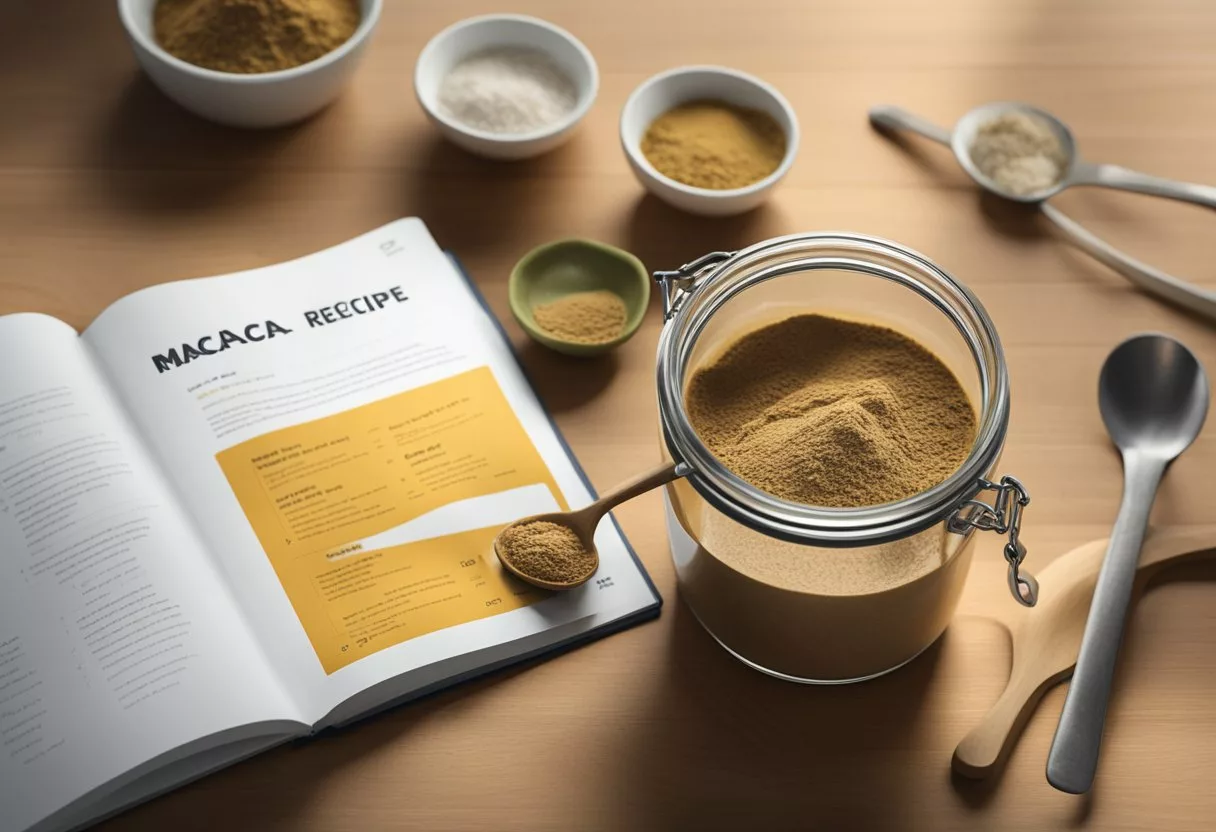Maca root, a plant native to Peru and known scientifically as Lepidium meyenii, has been used for centuries for its medicinal properties. This cruciferous vegetable is gaining popularity worldwide as a supplement due to its potential health benefits. Maca may help improve libido, fertility, energy, and mood, making it an attractive natural remedy for many.

For women, maca root can be particularly beneficial during menopause, helping to manage symptoms like hot flashes and mood swings. Men may find it helpful for boosting energy and improving sexual health. In addition to these specific benefits, some studies suggest that maca can aid in managing stress and supporting overall hormone balance.
Understanding the possible side effects and proper dosage is crucial when incorporating maca into your routine. While many users report positive benefits, it’s important to approach any supplement with awareness and caution. Keep reading to learn more about how this ancient Peruvian root can be a valuable addition to your health regimen.
Key Takeaways
- Maca root may improve libido, fertility, and mood.
- Women find maca helpful for menopause symptoms, while men use it for boosting energy.
- Proper dosage and awareness of potential side effects are important when using maca.
Historical and Cultural Significance

Maca root, known for its traditional and historical importance, has deep roots in Peruvian heritage. It’s cultivated in the Andes Mountains and has been used for nutrition and medicinal purposes for centuries.
Origin and Cultivation in Peru
Maca, also called Peruvian ginseng, originates from the high Andes mountain ranges in Peru and Bolivia. This hardy plant thrives at altitudes between 12,000 and 15,000 feet. It is one of the few crops that can grow in such harsh conditions, with the region’s climate contributing to its unique properties. Nearly all high-quality maca products still come from this area, maintaining a connection to its traditional roots. The cultivation involves practices that have been passed down through generations, ensuring the preservation of its quality and potency.
Traditional Uses in Food and Medicine
Traditionally, maca has been an essential part of the Andean diet and medicine. The root is often dried and ground into powder, which can be used in various dishes. It was also consumed by Inca warriors to increase strength and stamina.
Maca’s medicinal uses are vast. It is known for treating hormonal imbalances, inflammatory conditions, and symptoms of menopause. Additionally, it aids with osteoporosis and prostate health, and increases fertility and libido. The leaves can be eaten raw or cooked as a vegetable, adding to its nutritional value. The red, black, and yellow varieties each have distinct benefits, with traditional practices valuing these differences for specific treatments.
This historical and cultural significance of maca root highlights its enduring value in Andean society, bridging the past with modern applications.
Nutritional Profile
Maca root is packed with a variety of essential nutrients that support overall health. It contains important vitamins, minerals, fiber, and protein, making it a highly nutritious addition to any diet.
Vitamins and Minerals Content
Maca root is rich in vitamins and minerals essential for good health. It contains vitamin C, which supports the immune system, and B vitamins, which help with energy metabolism. Additionally, it has high levels of important minerals like calcium, which is crucial for bone health, and iron, which is important for blood health.
Maca also contains copper, magnesium, and potassium, which contribute to various bodily functions. It is a good source of glucosinolates, compounds that may help protect cells and tissues in the body. These nutrients work together to support overall wellness and vitality.
Fiber, Protein, and Amino Acids
Maca root is a great source of dietary fiber, which aids digestion and promotes a healthy gut. It provides about 7 grams of fiber per 100 grams. The root is also rich in protein, supplying around 10-14 grams per 100 grams, making it beneficial for muscle repair and growth.
Additionally, maca is packed with essential amino acids, the building blocks of protein. It includes all nine essential amino acids, ensuring that the body gets what it needs for various functions. These nutrients make maca root an excellent dietary supplement for those looking to enhance their nutrition intake.
For more information on these benefits, you can read more on maca nutritional profile and its benefits.
Health Benefits

Maca root offers various advantages including boosting energy and stamina, improving mood and managing stress, as well as enhancing sexual function and reproductive health. These benefits make it a versatile supplement for overall well-being.
Enhancing Energy and Stamina
Maca root is known to improve energy levels and stamina. It is commonly used by athletes to enhance performance. The root contains carbohydrates that provide a steady source of energy. Additionally, it acts as an adaptogen, helping the body cope with physical stress.
Studies indicate that maca can help fight fatigue, increase physical endurance, and improve overall vitality. For those experiencing energy slumps, maca may offer a natural way to stay energized throughout the day. Users often report feeling more alert and resilient after including maca in their diet.
Mood Improvement and Stress Reduction
Maca root may help improve mood and reduce stress. It contains flavonoids, which are believed to have mood-enhancing properties. Some studies suggest that maca can aid in reducing symptoms of anxiety and depression.
Research involving postmenopausal women has shown that maca can alleviate mood swings and stress related to hormonal changes. This makes it a potential natural remedy for those dealing with mood disorders. It supports mental well-being by balancing hormone levels, which can be especially beneficial for women going through menopause.
Sexual Function and Reproductive Health
Maca root is often linked to enhanced sexual function and reproductive health. Studies suggest it can improve libido and address sexual dysfunction issues, such as antidepressant-induced sexual dysfunction.
In men, maca can boost testosterone levels, which can help with erectile dysfunction and increase semen quality. For women, it may balance hormones and alleviate menopausal and menstrual symptoms. Improving hormone levels can enhance overall reproductive health and increase fertility.
These benefits make maca root a popular supplement for both men and women looking to improve their sexual and reproductive health naturally.
Specific Benefits for Women
Maca root offers several benefits tailored to women’s health. It can help with fertility and menstrual health, provide relief during menopause, and support postpartum well-being.
Fertility and Menstrual Health
Maca root may support fertility in women. It has been shown to help balance hormones, which is crucial for reproductive health. Hormones like estrogen and progesterone play a significant role in ovulation and menstrual cycles.
Women experiencing irregular periods or menstrual discomfort may find maca helpful. It can contribute to easing symptoms such as cramps and mood swings. Maca is also thought to help increase libido and sexual desire, which can be beneficial for couples trying to conceive.
Menopause Symptom Relief
Many women experience symptoms like hot flashes and mood changes during menopause. Maca root may help in alleviating these menopausal symptoms. Research suggests that maca can support hormonal balance by regulating estrogen levels.
A study showed that maca reduced the severity and frequency of hot flashes and night sweats in menopausal women. It also helped improve mood and reduce anxiety. These benefits make maca a natural option for those seeking relief from menopause discomfort.
Postpartum Support
After childbirth, many women face postpartum challenges such as hormonal imbalances and low energy levels. Maca root may help during this period by supporting hormone regulation and boosting energy.
For breastfeeding mothers, maca can enhance milk supply and improve overall well-being. The root’s natural properties aid in recovering from childbirth and addressing postpartum depression. Maintaining a balanced hormone level is crucial for new mothers, and maca offers a natural pathway to achieve this balance.
Specific Benefits for Men

Maca root has several important benefits specifically for men, such as influencing testosterone levels and improving sperm quality, which can impact sexual function and fertility.
Impact on Testosterone Levels
Maca root has been studied for its potential effect on testosterone levels. It is known to support hormonal balance in men, which can have positive effects on overall health and sexual function. While not directly boosting testosterone to a large extent, maca root can help stabilize hormone levels, which may be beneficial for maintaining energy and stamina.
Consuming maca root regularly may also help the body adapt to stress, which could indirectly support testosterone production. Reduced stress levels are crucial, as prolonged stress can negatively influence hormonal balance. For detailed insights, check the study on maca’s hormone support.
Improving Sperm Quality
Maca root is often recognized for its benefits related to male fertility, particularly in improving sperm quality. Some studies have shown that regular consumption of maca root may enhance sperm concentration and motility, which are key factors in fertility.
In a particular study, men who consumed 1.75 grams of maca daily for 12 weeks showed slight improvements in sperm quality. These findings suggest that maca root could be a natural supplement to support male reproductive health. For more details, see the research on maca’s effect on sperm quality.
Overall, incorporating maca root into one’s diet may significantly benefit men by aiding hormone balance and enhancing fertility.
Potential Therapeutic Effects

Maca root has several potential therapeutic effects, including its antioxidant properties that may aid in cancer prevention, its cognitive enhancement and neuroprotective effects, and its contribution to cardiovascular health. Each of these benefits has been explored through various studies and observations.
Antioxidant Properties and Cancer Prevention
Maca root contains antioxidants that help combat free radicals in the body. These free radicals can cause oxidative stress, which is linked to various chronic diseases, including cancer.
Some studies suggest that the antioxidants present in maca root may prevent or slow down the growth of certain cancer cells, including breast cancer cells. The actual mechanisms are still being studied, but initial findings are promising.
Furthermore, these antioxidants may help improve energy levels by reducing oxidative stress, allowing the body to function more efficiently.
Cognitive Enhancement and Neuroprotective Effects
Maca root may have positive effects on cognitive function and memory. Studies on rodents have shown that maca extract can improve learning and memory performance.
The root’s neuroprotective properties may help shield the nervous system from damage. These effects are thought to be due to the antioxidant compounds found in maca, which can counteract the effects of oxidative stress on the brain.
This makes maca potentially beneficial for those seeking natural supplements to enhance cognitive function and protect against neurodegenerative conditions.
Contribution to Cardiovascular Health
Maca root may contribute to cardiovascular health by helping to manage blood pressure. One study found that taking 3.3 grams of maca daily for 12 weeks lowered blood pressure in postmenopausal women.
This ability to regulate blood pressure could be especially important for cardiovascular health, as high blood pressure is a major risk factor for heart disease.
In addition to lowering blood pressure, maca’s antioxidants may also reduce the risk of atherosclerosis by preventing the oxidation of cholesterol, further supporting heart health.
Usage and Dosage

Maca root can be consumed in various forms such as powder, capsule, or extract, and the appropriate dosage depends on the desired benefits. It’s essential to know common recommended dosages and how to incorporate maca into your diet effectively.
Recommended Dosages
The typical daily dosage for maca varies based on the form it is consumed. For maca powder, a common recommendation is 1.5 to 5 grams per day. Users typically start with a smaller dose to assess tolerance and then gradually increase.
For capsule or tablet forms, manufacturers often suggest 450 milligrams to 3 grams per day. It’s important to read the product label and follow the specific dosage instructions provided.
Higher doses are sometimes used in studies, but it’s best to consult a healthcare provider before significantly exceeding standard dosages.
Various Forms and How to Use Them
Maca is available in several forms including powder, capsules, tablets, and liquid extracts. Maca powder is versatile and can easily be added to smoothies, baked goods, and other foods.
Capsules and tablets provide a more convenient option for those who don’t enjoy the taste of maca or need a more portable form. Liquid extracts offer a concentrated dose and can be mixed into drinks or taken directly.
When choosing a form, consider your lifestyle and how best you can incorporate it into your routine.
Incorporating Maca into Diet
Adding maca to your daily diet can be simple. For instance, incorporating 1-2 teaspoons of maca powder into morning smoothies can provide an energy boost. Maca powder can also be added to oatmeal, yogurt, or baked goods like muffins and pancakes.
Capsules and tablets can be taken with water and are handy for those with a busy lifestyle. Liquid extracts can be added to beverages like tea, juice, or coffee.
Maca has a slightly nutty, earthy flavor that blends well with many foods and drinks, making it relatively easy to incorporate into a balanced diet.
Potential Side Effects and Precautions

Maca root has a range of side effects and interactions that users should be aware of. It is important to understand the potential risks and follow guidelines to ensure safe consumption.
Common Side Effects
Some users have reported moodiness, cramping, and stomach distress after consuming maca root. It’s also possible for individuals to experience changes in energy levels, either increased or decreased. While these side effects are usually mild, they can be more pronounced for some people, especially if taken in large quantities.
There have been anecdotal reports of headaches and insomnia as well. Issues may arise due to hormonal changes, as maca can affect estrogen levels and other hormones. If symptoms persist or worsen, it is crucial to seek advice from a physician.
Interactions and Contraindications
Maca root may interact with certain medications, especially those affecting hormone levels. For instance, people taking antidepressants or medication for thyroid problems should exercise caution. Maca can potentially alter the effectiveness of these medications, increasing the risk of side effects.
Individuals with certain medical conditions like high blood pressure or those on hormone replacement therapy should also be cautious. Pregnant or breastfeeding women should avoid maca unless advised by a healthcare professional. It’s essential to consult a physician before starting maca root to avoid any unintended interactions.
Guidelines for Safe Consumption
To minimize risks, it’s recommended to start with a small dosage and gradually increase it while monitoring any adverse effects. Opting for third-party tested maca products ensures quality and safety. These products are tested for contaminants and potency, providing an extra layer of assurance.
Users should follow the dosage instructions on the product label or as directed by a healthcare provider. It’s typically advised not to exceed more than 3 grams per day unless supervised by a healthcare professional. Taking breaks from maca consumption every few weeks can also help mitigate potential risks.
Ensuring safe consumption involves being informed about the possible side effects and interactions. Always speak with a physician before adding maca root to your regimen, especially if you have existing health conditions or are taking other medications.
Comparisons and Alternatives

Maca root is often compared to other adaptogens and superfoods because of its health benefits. Key comparisons focus on how maca differs from other popular health supplements and natural remedies.
Maca versus Other Adaptogens
Maca root is frequently compared to ginseng, another popular adaptogen. Both are used to increase energy and reduce stress but they work differently. Ginseng tends to provide a quick energy boost, while maca offers a more sustained increase.
Another adaptogen to compare is ashwagandha. Unlike maca, which is known for supporting hormonal balance, ashwagandha is primarily used to reduce anxiety and improve mental clarity. While both can lower cortisol levels, ashwagandha is often favored for its calming effects.
When comparing maca with other adaptogens like rhodiola, the focus is on endurance and recovery. Rhodiola helps with physical performance and recovery, similar to maca. However, maca is more frequently noted for enhancing libido and fertility. Each adaptogen has its unique benefits, making the choice dependent on individual health needs.
Maca versus Other Superfoods
Maca root is also compared to a variety of superfoods. For example, kale, broccoli, and cabbage offer numerous vitamins and minerals but lack the adaptogenic properties of maca. These cruciferous vegetables are rich in antioxidants and essential nutrients but are primarily used for their nutritional value rather than hormonal support.
Comparing maca to spirulina or chlorella, both of which are algae known for high protein and nutrient densities, highlights different primary benefits. While spirulina and chlorella detoxify the body and boost immune function, maca is more recognized for its energy-boosting and hormone-balancing properties.
Superfoods like chia seeds and flaxseeds are known for their omega-3 fatty acids and fiber. Unlike these seeds, maca is not typically consumed for its fiber content but for its potential to support reproductive health and stamina. Each superfood offers distinct benefits, making them complementary rather than directly interchangeable with maca.
Scientific Research and Studies

Scientific research on maca root has shown various health benefits, particularly in areas such as sexual function, energy levels, and nutritional value. This section focuses on human clinical trials and animal model research to highlight the important discoveries made in the study of maca root.
Human Clinical Trials
Studies have shown that maca root may improve sexual function and fertility in men and women. In a systematic review, preparations from maca root were reported to improve sexual function. Another study found that maca is effective in reducing menopausal symptoms like hot flashes and mood swings.
Research also indicates that consuming maca can enhance energy levels and overall mood. Maca is rich in essential nutrients such as fiber, amino acids, and vitamins like Vitamin C, which contribute to its beneficial effects. Moreover, some studies have noted improvement in semen quality in men taking maca supplements regularly.
Animal Model Research
Animal studies on maca root have provided complementary evidence to human clinical trials. These studies often involve rodents and aim to understand the physiological effects of maca. Research has shown that maca can improve stamina and endurance in mice, suggesting its potential to boost energy levels.
Other studies in animal models have focused on reproductive health. Results indicate that maca can enhance fertility in animals. For instance, maca supplementation has been linked to increased sperm count and motility in male rodents. Additionally, animal research has explored the adaptogenic properties of maca, demonstrating its potential to help animals cope with stress.
By examining these studies, it is evident that both human and animal research supports the health benefits of maca root, particularly in the areas of fertility, energy, and overall well-being.
Frequently Asked Questions

Maca root offers various health benefits for both men and women. It may help with sexual health, mood, and energy levels, but there are also potential side effects to be aware of.
What are the health advantages of incorporating maca root into a woman’s diet?
Maca root can assist in relieving symptoms of menopause by reducing hot flashes and mood swings. It may also improve energy levels and boost mood, helping women feel more balanced and active.
How does maca root supplementation impact men’s health?
Maca root is believed to enhance sexual desire and may help with erectile dysfunction. It can also support energy levels and improve overall stamina, making it a beneficial supplement for men looking to increase their vitality.
What are the possible side effects of consuming maca root?
Some individuals may experience digestive issues, such as stomach upset or cramping. Others might find they have difficulty sleeping if taken later in the day. It’s important to use maca root in moderation to avoid these effects.
When is the optimal time of day to take maca root for maximum benefit?
Morning is generally considered the best time to take maca root. Taking maca early in the day can help capitalize on its energy-boosting properties and ensure it doesn’t interfere with sleep.
How long typically does it take to notice the effects of maca root supplementation?
The effects of maca root can typically be noticed within a few weeks of consistent use. Most users start to experience the benefits after about 2-3 weeks, with full effects often taking up to 8 weeks.
Are there specific sexual health benefits for females who take maca root?
Yes, maca root can help increase sexual desire and may alleviate symptoms related to sexual dysfunction. It is also believed to improve fertility in women by balancing hormone levels and increasing overall reproductive health.